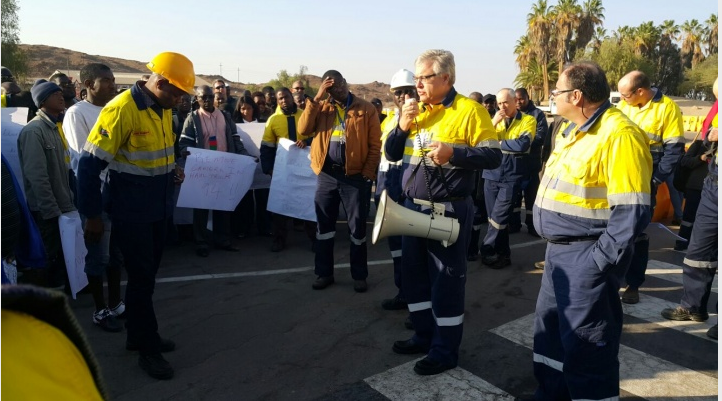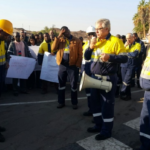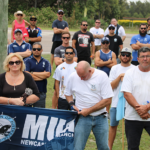1 February, 2016Struggles are building in a number of countries against attempts by Rio Tinto to increase the use of precarious labour.
In Namibia, Rio Tinto Rössing uranium mine management finally met with the Mineworkers Union of Namibia (MUN) on 28 January, nearly four months after workers rallied and demanded dialogue about ending exploitation of contractors. This includes paying some contractors only one-seventh as much as regular workers, forcing them to work longer hours with less job security and victimisation of union members.
“Rio Tinto says that freedom of association is one of its priority human rights issues,” stated IndustriALL assistant general secretary Kemal Özkan. “The company must take responsibility for its Namibian contract employees being denied this right.”
Although MUN’s continuing pressure forced Rio Tinto management to agree to a meeting, the company recently announced it intends to outsource all conveyor maintenance jobs. MUN plans to keep up pressure on the company and awaits a response to its demands.
In Iceland, unions have worked for over a year without a collective bargaining agreement. They are resisting Rio Tinto’s plan to outsource a large fraction of the aluminium smelter’s workforce to contractors paid significantly less than direct employees. The company has refused to agree that the outsourced jobs be paid the same as direct employees.
The unions in Iceland continue discussions with the company and have recently networked with the Rio Tinto Global Union Network to develop strategy.
In Australia, the Maritime Union of Australia (MUA) held a rally on 29 January to protest Rio Tinto replacing a vessel represented by MUA with one whose workers’ pay and conditions are far inferior. The workers transport alumina from a Rio Tinto refinery to a Rio Tinto aluminium smelter.
The vessel Rio Tinto plans to now charter is Greek owned, with a Liberian flag and a full Filipino crew.
“We are being replaced by the most exploited workers in the world. Workers who have no say, workers who can’t go to the boss and say, ‘No, I’m not going to do that job because it’s unsafe,’” said MUA assistant national secretary Warren Smith.
Unions representing workers at Rio Tinto in fourteen countries sent a letter to Rio Tinto’s CEO on 7 October requesting to work collaboratively with the company to address problems related to the company’s increasing use of precarious labour.
“The current disputes at Rio Tinto in Australia, Iceland and Namibia are part of a global problem,” said Kemal Özkan. “We’re ready to work together with the company to seek a global solution.”


